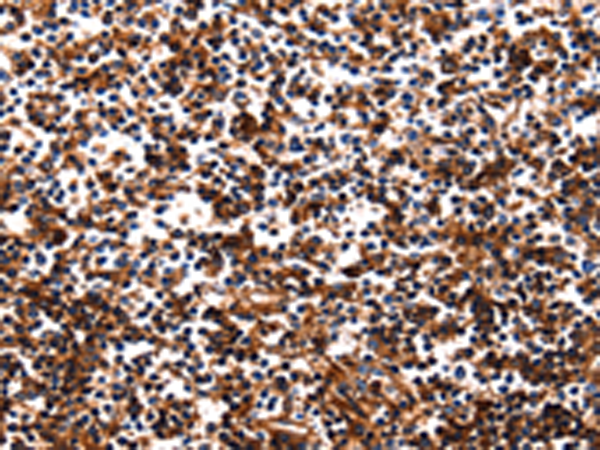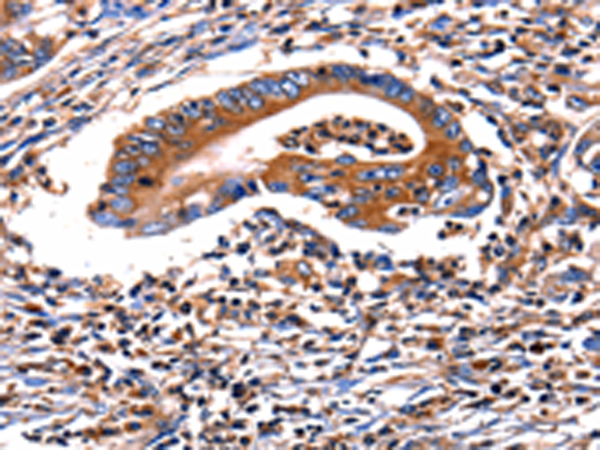

| WB | 咨询技术 | Human,Mouse,Rat |
| IF | 咨询技术 | Human,Mouse,Rat |
| IHC | 1/50-1/200 | Human,Mouse,Rat |
| ICC | 技术咨询 | Human,Mouse,Rat |
| FCM | 咨询技术 | Human,Mouse,Rat |
| Elisa | 1/1000-1/5000 | Human,Mouse,Rat |
| Aliases | BP, HPA1S, HP2ALPHA2 |
| Host/Isotype | Rabbit IgG |
| Antibody Type | Primary antibody |
| Storage | Store at 4°C short term. Aliquot and store at -20°C long term. Avoid freeze/thaw cycles. |
| Species Reactivity | Human, Mouse, Rat |
| Immunogen | Fusion protein of human HP |
| Formulation | Purified antibody in PBS with 0.05% sodium azide and 50% glycerol. |
+ +
以下是3篇关于幽门螺杆菌(HP)抗体的参考文献及其摘要概括:
---
1. **文献名称**:*"Accuracy of Helicobacter pylori antibody assays for detecting infection in patients with atrophy or partial gastrectomy: A systematic review and meta-analysis"*
**作者**:Leja M. et al.
**摘要**:该研究系统评估了HP抗体检测在胃黏膜萎缩或胃切除患者中的准确性。发现商用血清学试剂盒在存在胃黏膜结构改变时仍能保持较高的诊断敏感性(约85%),但特异性可能因试剂不同而异,建议结合临床背景使用。
---
2. **文献名称**:*"Association between Helicobacter pylori antibodies and risk of gastric cancer: A nested case-control study"*
**作者**:Plummer M. et al.
**摘要**:通过巢式病例对照研究,发现HP抗体(尤其是CagA抗体)阳性与胃癌风险显著相关(OR=2.9)。研究强调长期HP感染导致的持续抗体反应可能是胃癌发生的重要生物标志物。
---
3. **文献名称**:*"Evaluation of a rapid urine antibody test for population-based screening of Helicobacter pylori infection"*
**作者**:Okuda M. et al.
**摘要**:评估了一种基于尿液的HP抗体快速检测方法在人群筛查中的应用。结果显示其敏感性和特异性分别达89%和82%,提示该方法可作为大规模流行病学调查的非侵入性工具。
---
4. **文献名称**:*"Persistent Helicobacter pylori-specific IgA antibodies in gastric juice after eradication therapy: Implications for monitoring treatment outcomes"*
**作者**:Shimoyama T. et al.
**摘要**:研究发现根除治疗后,胃液中的HP特异性IgA抗体水平下降缓慢,可能干扰短期疗效评估,但长期追踪显示抗体持续阴性可预测治疗成功。
---
这些文献覆盖了HP抗体在诊断、疾病风险预测、非侵入性检测及疗效监测中的应用,反映了其多方面的临床价值。
**Background of H. pylori Antibodies**
*Helicobacter pylori (H. pylori)* is a gram-negative bacterium colonizing the human stomach, linked to gastritis, peptic ulcers, and gastric cancer. Detection of *H. pylori* antibodies plays a critical role in diagnosing infections, particularly in non-invasive serological testing. These antibodies, primarily IgG and IgA, are produced in response to bacterial antigens like urease and cytotoxin-associated gene A (CagA). IgG antibodies, the most commonly measured, indicate current or past infection, persisting months after eradication. IgA antibodies may reflect active mucosal immune response but are less sensitive.
Serological assays (e.g., ELISA) are cost-effective and non-invasive, useful for initial screening or epidemiological studies. However, antibody tests cannot distinguish active from resolved infections, limiting utility in post-treatment monitoring. They also show variable sensitivity due to antigenic diversity across strains.
Despite limitations, antibody detection remains valuable in regions with high *H. pylori* prevalence and limited access to endoscopic or urea breath tests. Recent advancements focus on improving antigen specificity, including recombinant proteins or immunoblot assays. Research also explores antibody profiles as biomarkers for predicting disease severity, such as gastric cancer risk associated with CagA-positive strains. Overall, *H. pylori* antibody testing bridges diagnostic and research needs in understanding bacterial pathogenesis and host immunity.
×